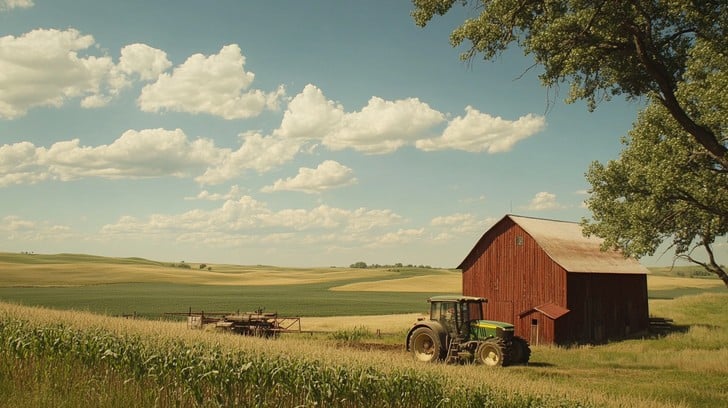America’s family farms and ranches are disappearing at an alarming rate. These small, often multi-generational operations are being swallowed up by massive agribusinesses that are consolidating farmland and control over both crop and livestock production. This trend is deeply worrying, with far-reaching repercussions for rural America, consumers, and the future of our food system. As someone who cares deeply about the survival of family farmers, it’s clear that we must act to reverse this dangerous shift before it’s too late.
Family farms have been a cornerstone of American life for centuries, embodying values of hard work, independence, and stewardship of the land. But over the past few decades, their numbers have dwindled. The U.S. has lost hundreds of thousands of family farms since the 1980s, with small and mid-sized operations being hit the hardest. In their place, large agribusinesses have expanded, buying up land and consolidating control over everything from seed production to meat processing. These corporations prioritize profit over people, often using industrial farming practices that degrade the soil, pollute waterways, and rely on heavy chemical inputs to maximize yields.
This consolidation is particularly evident in the livestock sector. The beef industry, for example, is now dominated by just a handful of massive companies that control the majority of meatpacking and distribution. Family ranchers, who once had a fair shot at selling their cattle in competitive markets, are now squeezed by these corporate giants. They face low prices for their livestock while consumers pay more at the grocery store, with the profits going to the middlemen. This dynamic, as highlighted by Robert F. Kennedy Jr. in a ZeroHedge article, is a stark example of how centralization hurts both producers and consumers.
The repercussions of this trend are devastating for rural America. Family farms and ranches are not just businesses; they are the lifeblood of small towns. When these operations disappear, so do the jobs, schools, and local economies that depend on them. Rural communities become hollowed out, with young people leaving for opportunities elsewhere and the social fabric unraveling. Farmers and ranchers, many of whom have worked the land for generations, are forced into debt or bankruptcy, unable to compete with the economies of scale enjoyed by agribusinesses. This loss of livelihood is a tragedy, not just for the families involved but for the cultural heritage of our nation.
Consumers are also paying a steep price. The consolidation of farmland and livestock production has led to a food system that is less resilient and more vulnerable to disruptions. When a handful of companies control the majority of our food supply, any shock—whether it’s a natural disaster, a disease outbreak, or a supply chain breakdown—can have catastrophic consequences. We’ve seen this in recent years with meat shortages and skyrocketing prices during the pandemic. Moreover, industrial farming practices prioritized by agribusinesses often sacrifice quality for quantity, resulting in food that is less nutritious and more reliant on chemicals. Consumers deserve better: fresh, healthy, and sustainably produced food from local farmers, not processed products from corporate monopolies.
The environmental toll is equally concerning. Family farmers and ranchers have long been stewards of the land, using sustainable practices to maintain soil health and protect natural resources. Agribusinesses, on the other hand, often prioritize short-term profits over long-term sustainability. Industrial farming contributes to deforestation, water pollution, and land pollution, undermining the very ecosystems that our food system depends on. If we continue down this path, we risk leaving future generations with depleted soils and a planet unable to support agriculture.
So, how do we reverse these trends and save America’s family farms and ranches? First, we need to break up the monopolies that dominate our food system. Antitrust laws must be enforced to prevent agribusinesses from consolidating power and exploiting farmers. Policymakers should support fair markets where family farmers and ranchers can compete, ensuring they receive fair prices for their products. Subsidies, which often disproportionately benefit large corporations, should be redirected to support small and mid-sized operations, particularly those using sustainable practices.
Second, we need to invest in rural communities. This means improving access to affordable credit, land, and resources for young and beginning farmers. It also means supporting local food systems, such as farmers’ markets and farm-to-table programs, that connect consumers directly with producers. By strengthening these connections, we can create a demand for locally grown food and provide family farmers with a viable path to success.
Third, consumers have a role to play. By choosing to buy from local farmers and ranchers, we can vote with our dollars and support a more equitable and sustainable food system. Education is key—consumers need to understand the true cost of cheap, industrially produced food and the value of supporting family farms. Community-supported agriculture (CSA) programs, co-ops, and other initiatives can help bridge the gap between farmers and consumers, fostering a sense of shared responsibility for our food system.
Finally, we must prioritize true sustainability. Family farmers and ranchers are uniquely positioned to lead the way in regenerative agriculture, which restores soil health, sequesters carbon, and protects biodiversity. By supporting these practices, we can build a food system that is resilient to swings in weather and capable of feeding future generations. Policymakers, researchers, and nonprofits should work together to provide farmers with the tools and knowledge they need to transition to sustainable methods.
America’s family farms and ranches are more than just businesses—they are a way of life, a source of pride, and a vital part of our nation’s identity. Losing them to massive agribusinesses is not inevitable, but it will take collective action to turn the tide. We owe it to our farmers, our rural communities, and ourselves to fight for a food system that values people over profits, sustainability over exploitation, and fairness over monopoly. The time to act is now, before the last family farm disappears and we are left with a future we cannot undo.


